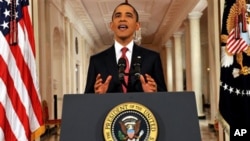President Barack Obama used a nationally televised address on Monday night to increase pressure on the U.S. Congress for a solution to the nation's debt limit and deficit crisis. With an August 2 deadline looming to raise the government's borrowing limit, Mr. Obama urged Americans to pressure lawmakers for a compromise.
After several weeks of tense meetings at the White House and on Capitol Hill, walkouts by Republicans, and warnings by credit rating agencies, Mr. Obama used his speech delivered from the White House East Room to ratchet up the pressure.
Earlier, Senate Majority Leader Democrat Harry Reid proposed a $2.7 trillion spending cut plan, with no cuts to Social Security and Medicare programs, a debt ceiling increase through next year's presidential and congressional elections, with a bipartisan committee recommending further cuts.
House of Representatives Speaker, Republican John Boehner's two-stage plan envisions $1.2 trillion in spending cuts, an immediate $1 trillion debt limit increase and another possible increase next year tied to conditions. Boehner's proposal would also create a bipartisan committee and have lawmakers vote on a constitutional amendment for balanced budgets.
President Obama said Boehner's plan is part of a "dangerous game" that would result in repeating the same debate six months from now.
"This is no way to run the greatest country on Earth. It is a dangerous game that we have never played before and we can't afford to play it now, not when the jobs and livelihoods of so many families are at stake. We can't allow the American people to become collateral damage to Washington's political warfare.," he said.
Earlier, Senator Reid said Republicans appeared determined to embarrass the president and force a showdown over the debt limit issue. He and fellow Democrat Charles Schumer said Boehner's hand was being forced by lawmakers closely linked to the conservative and libertarian Tea Party movement.
Senator Reid said "We should not let these extremists dictate the outcome of this debate or the direction of this country."
Schumer said "There are 100 people in the House who don't care if we default, any of them, who are extreme and ideological and who have not seen the House Republican leadership responsibly resist that."
In his own televised address after Mr. Obama's speech, Speaker Boehner said the president had engaged in a "massive spending binge" after which he requested a historic increase in the national debt.
"The sad truth is that the president wanted a blank check six months ago, and he wants a blank check today. This is just not going to happen," he said.
Boehner says he expects the proposal he unveiled on Monday to pass in the House, and he predicted approval in the Democratic-controlled Senate, adding that if Mr. Obama signs it into law, the crisis atmosphere he accused the president of having created would disappear.
In his address, President Obama did not issue a specific threat to veto the Boehner plan. He said he wants congressional leaders to come up with a fair compromise in the next few days that can pass the House and Senate, and that he can sign. He said Americans are "fed up" with Washington, "where compromise is a dirty word."
"The American people may have voted for a divided government, but they did not vote for a dysfunctional government" Obama said. "So I am asking you all to make your voice heard. If you want a balanced approach to reducing the deficit, let your member of Congress know. If you believe we can solve this problem through compromise, send that message."
While the president endorsed Senator Reid's proposal, he repeated that a long-term solution to the nation's fiscal woes needs to include savings in costly entitlement programs such as Social Security and Medicare to enable them to survive.
In the Senate, the Reid plan might be blocked by Republican procedural tactics, and it is unclear whether Speaker Boehner can get the votes to pass his plan, despite a strong Republican majority in the House.
Saying that default would be "a reckless and irresponsible outcome" to the debate, Mr. Obama said he is confident that compromise can be reached and that enough lawmakers from both major political parties will ultimately put politics aside.
U.S. and global markets around the world are waiting anxiously for the White House and Congress to come up with a solution to America's debt limit crisis. Although financial markets have not suffered major losses, economists warn of serious repercussions from a rise in interest rates that would likely follow a U.S. default, with some saying there already has been significant damage to America's credit worthiness.





